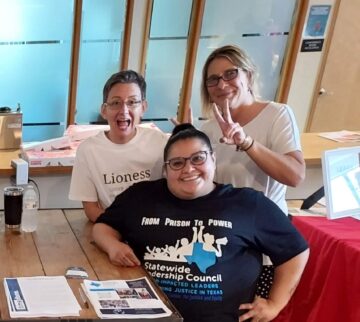When Jennifer Toon arrived at yet another prospective Austin rental in November 2021, she was welcomed by a dead rat. Its tail, curled limply on the duplex parking lot, was thicker than her cat’s.
While the rat seemed welcome, Toon soon learned that she was not. As one of nearly 70 million Americans with criminal records, Toon continues to face “collateral consequences,” including housing and employment obstacles, over a decade after her conviction—even in a “Fair Chance” haven like Austin.
“The worst experience trying to find housing has been in Austin,” Toon told the Texas Observer. “I have offered double deposit, double the first month’s rent. … I’m essentially just living where people will allow me to live.”
After her release from prison in December 2018, Toon struggled to find sustainable employment in her hometown of Kilgore in East Texas, and moved to Austin in 2020 when she got a job at the Coalition of Texans with Disabilities.
It’s a familiar pilgrimage for many formerly incarcerated Texans; in the law-and-order-loving Lone Star State, Austin has stood out as the only city with a Fair Chance Hiring Ordinance since it was implemented in 2016. Since then, second-chance hiring has gained traction in DeSoto, which implemented its own ordinance in January. Its northern neighbor, Dallas, has been weighing a similar proposal in its city council since September.
With Fair Chance hiring in place, private employers with 15 or more employees cannot request an applicant’s criminal record until a conditional employment offer has been made.
“We’re doing things a little differently here in Dallas now,” Fair Chance proponent and Dallas City Council member Omar Narvaez told the Texas Observer. “We have to work together to figure out how we can keep people from falling into the system and not being able to get out of it.”
“We have to work together to figure out how we can keep people from falling into the system and not being able to get out of it.”
But in both Dallas and Austin, a tricky chicken-versus-egg scenario has emerged as formerly incarcerated residents search for viable housing options.
When Lori Mellinger returned from work early one March morning, she was surprised with a “for sale” sign leaning against her duplex.
From February 2021 through February 2022, rents rose more in Austin than in any other U.S. city, according to Redfin. After slowing this summer, average rent still climbed 10 percent from October 2021 to 2022. Eager to cash in on the pandemic housing craze, when home prices swelled by as much as 20 percent from year to year, Mellinger’s landlord gave their tenant two months to pack up and move out.
Mellinger, who, like Toon, left the East Texas pineywoods for Austin around seven years after her conviction, had a few weeks to go before she found a property owner who didn’t screen for criminal records in Lockhart, 40 minutes from downtown.

As long as they aren’t violating the Fair Housing Act, landlords can deny any applicant that violates their screening process. Around 80 percent of landlords screen for criminal records.
Pulled in by employment opportunities but pushed out by housing barriers, Toon said many formerly incarcerated residents bounce between friends’ houses, put their rentals in a family member’s name, or find other ways to live in the city that claimed to welcome them.
“You feel like a fugitive,” Toon said. “I have another friend who lives out of her car, and she’s got a great job. You’re terrified to tell people where you live … [there are] programs to help you get a job right away, but what’s all that for if you have nowhere to live?”
In the closely-knit Venn diagram of Texas’ criminal justice advocacy groups, Maggie Luna is almost always at the intersection.
While serving a sentence for drug charges at the Lucile Plane State Jail, Luna experienced Hurricane Harvey behind bars. For the first time, the big fans ventilating the already-stagnant dorms stopped. Toilets wouldn’t flush. Shower faucets stayed dry for a week. Phones were cut off and with the kitchen flooded, inmates weren’t fed meals for two days.
“I remember looking at my bunkie and I said, ‘Man, you are not the face I want to be looking at when I die,’” Luna told the Observer.
Her Harvey experience and months at The Women’s Home, which offers resources and affordable housing to women in Houston, after her release inspired her to begin advocating for formerly incarcerated people. While looking to enter the nonprofit sphere, she quickly found a job at a Marriott hotel, folding towels for $10 an hour. Finding safe housing was significantly more challenging.
“It was very hard for me to stay sober there,” Luna said. “The places [where] we’re forced to live and reenter society are very dangerous for our mental health or well-being. They want us to come back into society and not do anything wrong, but live desperately.”
‘There are programs to help you get a job right away, but what’s all that for if you have nowhere to live?”
There are a few narrow pathways for Texans with criminal records. After completing a waiting period, some first-time nonviolent misdemeanor offenders and felony offenders who are pardoned or who complete deferred adjudication are eligible to get their records expunged or sealed through nondisclosure. When expunged, records are essentially erased from existence; sealed criminal records leave them accessible to law enforcement and other agencies but not to landlords or potential employers.
Just under 25 percent of criminal cases disposed in 2020 ended in deferred adjudication, while 45 percent resulted in convictions. For those who do qualify, the expunging and sealing process isn’t automatic. Offenders who want to clear their records will need to be aware that they are eligible and find an attorney to represent them before the years-long path to relief begins.
For El Paso resident Erick Pacheco, that relief came over 20 years after his conviction.
Pacheco picked up charges as a teenager and spent most of his first half of life grappling with the hurdles associated with a criminal record. Pacheco was told early on that he didn’t qualify for expungement, and he spent the next decade drowning in denied job applications, side-eyes from law enforcement, and housing difficulties.
“You never know what was going on in a person’s life that led them to make those kinds of decisions or mistakes, so when they’re actually trying to change their life, and you’ve got something like this stopping you from changing it, it really sets you back,” Pacheco told the Observer.
Years later, Pacheco learned he was eligible to have his record expunged when he happened to tune into a National Public Radio episode. Over 20 years after his charges, Pacheco became one of the 6.5 percent of eligible people to successfully get his record cleared.
In an instant, doors that had been closed for decades reopened. When applying for his new job, Pacheco no longer had to prepare himself for a difficult conversation, and questions never come up anymore when he crosses the Texas-Mexico border for work.
Some cities are providing viable pathways for their justice-impacted residents as well. While Fair Chance Hiring hasn’t passed for private employers, Dallas encourages formerly incarcerated individuals to apply for city employment through its Fresh Start program. The city council approved a $1.5 million grant to support reentry services through nonprofit partnerships in 2023 and 2024, and the city works to house formerly incarcerated residents with HIV and AIDS.
“Dallas had an opportunity during COVID for the world to stop and see what really matters,” said Joyce Williams, the managing director of the Fresh Start program. “And affordable housing matters, which means homelessness matters, unsheltered people matter. And we don’t have a strong workforce or labor force, so all of a sudden employment matters. All of that is rehabbing lives. … Rehabilitation is more important than incarceration.”
Far from the Central Texas Fair Chance Hiring trend, faith and forgiveness are fueling change in an unlikely West Texas city. Abilene, which hosts two correctional facilities, has employed a spirit of grace from outside of city hall.

Rosten Callarman, who owns 24 rental units in Abilene, said there are some risks associated with accepting applications from people with criminal histories, especially if they have recent, violent offenses. Instead of performing blanket screenings, Callarman emphasizes a personal relationship between himself and his tenants.
“So many landlords and property managers will immediately screen someone out for almost any kind of criminal history,” Callarman said. “Context is so important to understand the journey that person’s on, and that’s really the thing that we’re trying to understand.”
One of Callarman’s Abilene properties served as a launching point for Mellinger when she was first released. Although he’s had a few issues come up from tenants with difficult backgrounds, Callarman said he doubts his experiences are any different than other property managers.
“We’ve had several instances where someone said literally no one would look at them or even consider them an option, and then they’ve ended up staying at one of our units for years and been amazing tenants,” Callarman said.
For Plano native Andre Gwinn, the city has become a permanent refuge. After spending time at the Collin County Jail, Gwinn moved to Abilene in 2012 for a fresh start. Now an employment and resource specialist at Goodwill, Gwinn is a member of the Big Country Reentry Coalition, a volunteer-based reentry advocacy group serving the Abilene area, and sits on the Abilene Black Chamber of Commerce alongside Mayor Anthony Williams.
“More and more often, I find myself in rooms with people who have no idea that they’re sitting next to a felon,” Gwinn said. “I feel very hopeful that a lot of the work that we do here in Abilene will be replicated throughout this state.”
Meanwhile, Mellinger, Luna, and Toon are looking to transfer that mindset to the statewide level.
Bonded by shared experiences and a close-knit Austin advocacy scene, the trio teamed up to form the Lioness Justice Impacted Womens’ Alliance, which aims to end “the incarceration and systematic devaluing of the girls and women within the Texas criminal legal system.” They’ve also become close friends.
“I’m a big believer in community,” Mellinger said. “We know from experience that if we don’t take care of each other, then no one else is going to.”

A month before Texas’ midterm elections, the trio, alongside a dozen other members of the community, headed to a retreat to discuss their next move. In a short weekend, the group finalized four priorities for Texas’ next legislative session.
Each member has their own focus for the next session. Luna, who coordinates the Statewide Leadership Council (SLC) and is the chapter coordinator for national advocacy group TimeDone, is focused on the Emergency Planning Bill, which would implement an emergency plan for Texas Department of Criminal Justice facilities in the case of natural disasters. The bill would also require a special advisory board that gives formerly incarcerated Texans a seat at the table.
Both Toon and Mellinger are focused on common-sense parole, which would give incarcerated people access to personalized rehabilitation services once they enter the system. Instead of waiting until parole begins, individuals would be given the opportunity to take classes and programs necessary to complete their sentence before release.
The SLC’s final priority is the national Clean Slate Initiative. The initiative, which has successfully passed legislation in eight states, would automate record nondisclosure in Texas. Under a proposal dubbed “New Wings,” record sealing eligibility would expand to all people who have fully discharged their sentences and remain crime-free for up to 10 years, depending on the conviction. It would also shorten the waiting period for nondisclosures, which can last for up to five years.
The Clean Slate Initiative places housing reentry barriers front and center for the upcoming session.
“We have this great facilitator who used to work for the Texas Criminal Justice Coalition, and he said, ‘If there’s one thing about Clean Slate that really speaks to you, what would it be?’” Mellinger said. “And all of us immediately said housing. It’s all about the housing.”
“We know from experience that if we don’t take care of each other, then no one else is going to.”
Clean Slate Texas coalition member Sarah Mae Jennings has spent the last two years directing pro bono record expungement for Texans through the state’s Fair Defense Project. More often than not, she’s had to tell people they are ineligible for their services; she hopes to see more success stories through Clean Slate.
“Being able to finally remove that scarlet letter, to move past somebody’s records, to continue on with their lives and have that confidence and that feeling of worthiness makes all the difference,” Jennings told the Observer.
On election day, Texas Republicans easily maintained an iron grip on statewide office, cementing four more years of generally tighter criminal justice policies. But Jennings is hopeful. Last session, the Clean Slate automation bill saw nonpartisan support before running out of time.
“We’re taking all of these tough conversations that I’ve been having with people about why they’re not eligible, and bringing that to the legislature to let them know what’s actually happening on the ground,” Jennings said.
Some legislators are already involved. Democratic state Representative Jarvis Johnson, from Harris County, will sponsor the Common Sense Parole bill, while Bexar County Democratic Representative Philip Cortez will sponsor the emergency planning bill. Finally, state Democratic Representative Alma Allen, from District 131 (primarily in Harris County), will head the New Wings initiative.
As business moves forward in the Legislature, Clean Slate advocates, like Texas Women’s Justice Coalition coordinator Cynthia Simons, will continue to push for forgiveness on the ground.
“Whether you want to give people who are formerly incarcerated another chance or not, their children go to school with your children, they shop in the same grocery stores, and they are in your neighborhood. So the best thing we could do to create safer and healthier communities in the state of Texas is to uplift this very vulnerable population,” Simons told us. “We’re going to do everything we can to get that bill passed so that families and impacted people in Texas will have the opportunity to have decent housing.”







